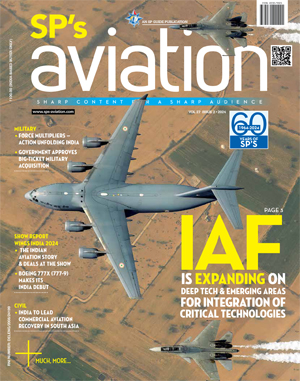INDIAN ARMED FORCES CHIEFS ON
OUR RELENTLESS AND FOCUSED PUBLISHING EFFORTS

SP Guide Publications puts forth a well compiled articulation of issues, pursuits and accomplishments of the Indian Army, over the years

I am confident that SP Guide Publications would continue to inform, inspire and influence.

My compliments to SP Guide Publications for informative and credible reportage on contemporary aerospace issues over the past six decades.
India becomes 43rd member of Australia Group
India, on January 19, was formally inducted as the 43rd member of the Australia Group (AG), a voluntary group of countries working to stop the spread of chemical and biological weapons.
Announcing India's induction into the regime, AG, in a statement, said, "There was very strong support expressed for India's membership at the June 26-30, 2017 Australia Group Plenary, after which consensus was reached intersessionally. India then reaffirmed its intention to join the Group."
"Australia Group members recognised the Government of India's commitment to bring India's export control system into alignment with the Australia Group and India's determination to contribute to the global effort to prevent the proliferation of CBW (Chemical and Biological Weapons) in the security interests of all members of the international community," it added.
After becoming member of Wassenaar Arrangement (2017) and Missile Technology Control Regime (2016), this is India's third consecutive victory in entering into the exclusive weapons control club. Nuclear Supply Group (NSG) is the only non-proliferation regime that India is yet to become a member. China has been stone walling Indian efforts to enter it.
After the United Nation's team, in 1984, found out that Iraq has violated the Geneva Protocol and has used chemical weapons in Iraq-Iran war, Australia called for meeting of the countries with export control regime to meet and the group was thus called as Australia Group. In 1985 AG met for the first time in Brussels. Since then the group has met annually in Paris.
The group is not binding but works on the principle of shared obligation against the proliferation of the CBWs.
The control list of AG includes "technologies and equipment which can be used in the manufacturing or disposal of chemical and biological weapons."
The other members of the group are Argentina, Australia, Austria, Belgium, Bulgaria, Canada, Croatia, Republic of Cyprus, Czech Republic, Denmark, Estonia, European Union, Finland, France, Germany, Greece, Hungary, Iceland, Ireland, Italy, Japan, Republic of Korea, Latvia, Lithuania, Luxembourg, Malta, Mexico, Netherlands, New Zealand, Norway, Poland, Portugal, Romania, Slovak Republic, Slovenia, Spain, Sweden, Switzerland, Republic of Turkey, Ukraine, United Kingdom and United States.





